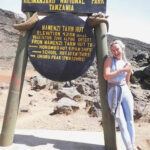
by Mikella Van Dyke | Nov 9, 2023 | Life Advice
My son’s eyes grew wide as he fixed them on an ambulance parked outside the coffee shop where we sat. His five-year-old mind, rich with imagination, sparked a thought-provoking question, “Mom! What happens if the ambulance driver needs help after a crash?” The thought struck me with its depth. In his eyes, the ambulance driver was the ultimate rescuer in life’s status equation. Should tragedy befall this medical savior, who would come to their aid?
His question caused me to reflect on where we go to for help when we are in crisis. Where do we turn when we exhaust the resources of our own self-reliance and can no longer be our own ‘ambulance driver?’ We know that we are called to prayer, but is it the first place we reach for help?
Often, our desire to pray is directly proportional to our sense of need. A friend of mine, who was an atheist, found herself praying in the midst of a near-fatal car accident. Her response showed me that even those who don’t believe in God find themselves in prayer in moments of extreme crisis. It’s desperation that ignites our urge to pray. A part of our human nature compels us to reach out for a strength beyond our own when we’re finally face to face with our own human limits. In such critical moments, prayer becomes an act of surrender, an acknowledgment of the hope that perhaps God is the source of our rescue and the one who can protect us.
Initially, we might try to mend our wounds or solve our problem by ourselves, seeking to bandage them up with online shopping, more alone time, or a weekend away. Depending on the problem, if that doesn’t remedy the situation, we might seek a primary care physician, turn to self-help books, or a friend’s advice. If the severity escalates, we may turn to the E.R. doctor or a counselor; someone who we really think can fix the problem. But often, it is only when faced with a life-threatening situation, something we can’t easily fix, or when all hope seems lost, that we turn to prayer to ask God for help. And in that moment, we come to the end of ourselves and acknowledge our own fragility, asking the mighty God of the universe to step in to save us, our one true ambulance driver.
The beauty of prayer is that it’s a place to acknowledge our own limitations and frailty and to seek God’s help and protection. We don’t have to tough it out or act like we have it all together. We are like plants in a field, sometimes fruitful and growing, but then suddenly we find ourselves at the mercy of grazing animals. We find ourselves defenseless to protect ourselves from a world that often doesn’t play by God’s rules. As our fragile leaves become the food of deer and rabbits, we also recognize our vulnerability to life’s metaphorical food chain through prayer. Recognizing that we are actually in need of God every day, prayer is an admission of our defenseless state, a request for His protection and ultimately a trusted place where we build an intimate connection with the truest of friends, Jesus. I used to watch the game show “Who Wants to be a Millionaire” where the contestant had a series of four multiple choice questions to choose from. If they answered the question correctly, they got a prize of money. But, at times, the contestant was stuck, unable to answer the question. At this, they were given the option to request a lifeline. The lifeline allowed contestants to call a pre-selected friend, relative, or acquaintance when they were unsure of an answer to a question. The friend was at home waiting, available to take the call. The friend was then given the current question wherein they would give their answer in a limited timeframe. We often view prayer in much the same way. If we get desperate enough, if we finally come to the end of our own answers, we’ll reach out and “call a friend,’ God.
But, what if we viewed prayer differently as a place to develop an intimate friendship with the God of the universe as opposed to someone we called upon only when we got desperate enough to need Him? Don’t let prayer become your phone-a-friend, only calling God when you’re really stuck or in need of wisdom. God knows we need prayer and He instructs us to pray at all times, pray until you die, and to pray and never give up. Pray at all times: As scriptures say, “Rejoice always, pray continually, give thanks in all circumstances; for this is God’s will for you in Christ Jesus” (1 Thessalonians 5:16-18)
Pray all the time: And also as scripture says, “pray as long as you have breath. Because he bends down to listen, I will pray as long as I have breath!” (Psalm 116:2) And never give up: And also as scripture says, “One day Jesus told his disciples a story to show that they should always pray and never give up.” (Luke 18:1)
From the surface, prayer may not appear “productive’” and yet we might be shocked if we knew how prayer enacts real change in the Kingdom. Prayer cannot be measured or quantified, but I can only imagine the saints who had no book deal, Instagram platform, or accolades who committed their lives to prioritizing prayer—it was in conversing with God that so much was accomplished on behalf of their prayers. I’m reminded of Jesus days. He had ended His time of active ministry on earth, He had stopped healing the sick, performing miracles, and preaching, but He still prayed. And within that prayer (John 17), He interceded on behalf of you and me. He prayed for the glory of the Father to be revealed, He prayed for unity among the body of believers, and He prayed that we would experience our Father’s love.
God has entrusted us with a powerful weapon to combat the forces of darkness: prayer. Through prayer, we ask that the power of Christ shake the ground around our circumstances or our friend’s circumstances by praying and agreeing with God’s Word. When believers collectively pray scriptures, it fosters unity. They are essentially coming together under the authority and guidance of God’s Word. May you and I remember the importance of prayer in all things, and urge each other onward in the practice of prayer. Knowing that in all things, prayer makes us even more aware of God’s presence in our midst.
Mikella Van Dyke is a wife, mother and the Founder of Chasing Sacred, ministry that provides resources to help women study the Bible and grow closer to God. What began as a devotional blog became an organization with a team of writers who produce theologically rich Bible Study resources. As she studied for her MA in practical theology at Regent University, she fell deeply in love with the process of hermeneutics and wanted to spread her knowledge and love of the Word to others. She also serves at her local church, Hope Fellowship in Jaffrey, NH where she co-leads women’s Bible study.
Keep up with her on Instagram @mikellavandyke
by Mikella Van Dyke | Dec 22, 2022 | Wisdom
I am right where I am supposed to be this Christmas.
Time marched forward on my grandmother’s old bird clock. As the next hour came, a different-sounding bird sang on the clock to remind us time had come and gone.
When you’re marching towards trying to fulfill a dream, time can feel like it’s moving too fast, like the constant song of the clock. If we could just seize the hour, we’d take hold of the day and get our dreams accomplished, right? Yet, on the other hand, time can also feel slow. Slow like a vulture circling down. When you’re praying for an unmet longing, it can feel like it’s taking too long for those prayers to be actualized.
In the Bible, Zechariah and Elizabeth knew what it was to long for something.. I am sure time passing felt more like a trail of tears with an unknown destination for them, as they wondered: would their dream of having a baby ever come to fruition?
Have you ever walked alongside a moving walkway in an airport? Travelers are marching by on the moving belt as if it is effortless. Somehow, they are still moving at the same pace as you, even though you are exerting twice the effort because you don’t have a motorized walkway assisting you. As you walk, you feel the heavy weight of the bags you chose to carry, and you wonder why the pace of other travelers appears to be effortless and twice as fast. Why are they getting to their desired destination quicker than you? That’s how it can feel to pursue a dream or wait for something other people have already been given. I have often wondered why certain friends or my peers appear to have gotten everything I want in this life— long before I have.
Zechariah and Elizabeth knew what it was like to feel like time had passed them by when it came to their deepest longings. They were “righteous in the sight of God” (Luke 1:6) but also barren. In that day, being barren was a huge source of shame. Even so, they faithfully served the Lord as their dream of a family melted into the background. I am sure they, too often, felt like they were walking the path of unmet desire.
Remember, Zechariah was a priest. One day it came time for him to fulfill a priestly obligation to enter the inner sanctuary. This was probably a once-in-a-lifetime opportunity. As he entered, he was unsure how God would meet him in that moment.
It is hard to hold desire loosely without feeling like you need to amputate or sever it to move forward. If you have ever encountered unmet desire in barrenness, miscarriage, singleness, or a dream that has died, you might feel a tinge of pain reading Zechariah’s response to the angel Gabriel. The angel Gabriel announced to Zechariah that he would have a son named John, the forerunner of Christ. Zechariah responded with a question, “How can I be sure of this? I am an old man and my wife is well along in years” (Luke 1:18). Zechariah had longed to have a family with Elizabeth, but it’s possible that, by this point, he had laid that dream aside.
Consider the angel Gabriel’s response as we look to celebrating Advent this year. He responds to Zechariah: “And now you will be silent and not able to speak until the day this happens, because you did not believe my words, which will come true at their appointed time” (Luke 1:20). Let’s focus on that “appointed time.”
God’s plan would come true at Zechariah’s and Elizabeth’s appointed time. To think about time, it may be helpful to know there was more than one word for “time” in Greek. The Greek language was more comprehensive than English when it came to time. One type of time was chronos time, which was what we think of as our regular hour, minute, and seconds. But the Greek language also named kairos time, which meant “an appointed time.” Here the angel Gabriel was referencing the word kairos time, an appointed time. God’s plan for John the Baptist and Christ would come true at their appointed time.
A wise friend recently told me, “Sometimes it’s just a matter of changing our terminology.” “Huh?” I questioned her. “Yes!” she explained. “You can say the same thing two ways.” She explained further: “One might call having to allocate your money a ‘budget,’ but the more positive way to spin it would be to call it a ‘spending allowance.’”
Two words or phrases can mean the same thing, but one word is focused on limits, and the other phrase focuses on the abundance of it. One makes someone think, “thrifty,” and the second makes someone feel “freedom in how I spend.” So, let’s translate this for us today. We could say God has given us freedom in how we spend our God-ordained minutes. And yet, at the same time, God has stretched his sovereign hand over our time and knows what is to come.
In Greek, both chronos and kairos mean “time.” But the two words mean very different things. Chronos is more familiar to us in English. Everything we do in America is governed by our chronological time or measurable time. We are used to this type of time! There are 24 hours a day, seven days a week, and we have somewhere to be every minute. Kairos, on the other hand, means “an appointed time.” It is explained conceptually as a designated time or right time to do something: an appropriate time, the best time, or God’s timing.
For Zechariah and Elizabeth, the birth of John the Baptist would come at the appointed time. God’s timing is never late, or early, even though it may have felt that way to Zechariah and Elizabeth. But maybe you are like me, and you are thinking, well of course, God has an appointed time for the arrival of John the Baptist and Christ. But the word kairos is used quite comprehensively throughout the New Testament – not only in referring to John the Baptist and Christ. Funny enough, the Bible uses kairos more often than chronos. The word kairos is used over 80 times!
What I want to offer to you this Christmas season is this: We can get so busy living in our chronos sense of time that we miss kairos moments. We have been so indoctrinated with time that we think of it as running out, instead of time that is waiting to be seized. What if we spent our days looking for kairos moments? God’s divine moments. Moments where the sacred intersects with our human lives.
The holidays are notorious for being about the rush. We often make it more about all the activities than seeing God in all the moments. For me, I have already been feeling anxious and run-down about my time. Let’s slow down and savor the gift of Christ. God has placed exact kairos moments in our lives. Are we waiting and watching to seize them? The suitable time to comfort that grieving friend. That opportune time to minister to your child by squatting down, looking them in the eye, and speaking words of encouragement to them. The kairos time to step out into a new job. The kairos time for God to mend your marriage. The kairos time for your little one to be born. Sometimes kairos time will look like meaningful moments, but God’s appointed times for things can also be found in the mundane. The kairos time to bring soup to a sick friend. The kairos time to burst out in worship. Don’t let chronos time speak to your deficit this Christmas. Instead, look for kairos moments that shouldn’t be missed and are God-ordained. Look for moments to celebrate Christ in every moment this season. Do not miss an opportune time to stop and worship him – the newborn King we have waited so long to meet, in His perfect time.
Mikella Van Dyke is the founder of Chasing Sacred, a ministry that provides resources to help women study the Bible and grow closer to God. What began as a devotional blog became an organization with a team of writers that has since published multiple Bible Study resources.
This past year, Mikella focused primarily on providing women with resources and tools for deeper Bible Study. Through studying for her MA in practical theology, she fell deeply in love with the process of hermeneutics. Moving across the world from Thailand to New York City to getting married and becoming a mom, Mikella loves to see women in every stage of life engage with God’s Word. When she is not writing, she is spending time with her 5 kids, traveling, and eating every cuisine she can think of.















